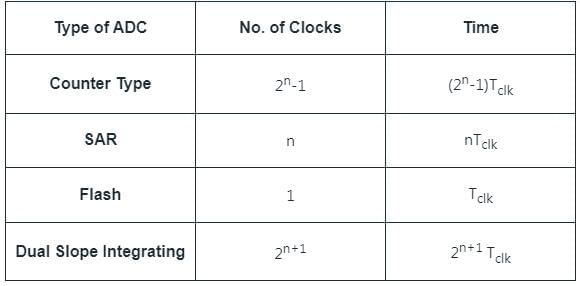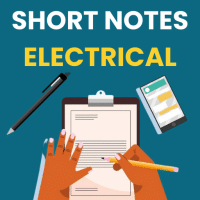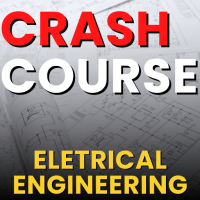Electrical Engineering (EE) Exam > Electrical Engineering (EE) Questions > Among the following four, the slowest ADC (an...
Start Learning for Free
Among the following four, the slowest ADC (analog-to-digital converter) is
- a)Parallel-comparator (flash) type
- b)Successive approximation type
- c)Integrating type
- d)Counting type
Correct answer is option 'C'. Can you explain this answer?
Verified Answer
Among the following four, the slowest ADC (analog-to-digital converter...
Integrating type ADC is the slowest.
The conversion time of different ADC is shown below.

From the above table, the fastest ADC is Flash Type ADC whose conversion time is independent of the number of bits.

From the above table, the fastest ADC is Flash Type ADC whose conversion time is independent of the number of bits.
Most Upvoted Answer
Among the following four, the slowest ADC (analog-to-digital converter...
Integrating type ADC is the slowest among the given options:
Integrating type ADC is the slowest among the given options due to its method of operation. This type of ADC uses an integrating amplifier to convert the input analog signal into a digital output. Here is why Integrating type ADC is the slowest:
- Conversion Process:
Integrating type ADC works by integrating the input analog signal over a specific period of time. This integration process takes time to accurately convert the analog signal into a digital output. This makes it slower compared to other types of ADCs like flash or successive approximation.
- Successive Approximation and Flash ADC:
Successive approximation and flash ADCs do not require the integration process like the integrating type ADC. Successive approximation ADC works by iteratively approximating the input signal, while flash ADC uses a parallel-comparator approach for conversion. These methods are faster compared to the integrating type ADC.
- Complexity:
Integrating type ADCs are more complex in design compared to other types, which can also contribute to their slower operation. The integrating amplifier and associated circuitry add to the conversion time of this type of ADC.
- Accuracy vs. Speed Trade-off:
Integrating type ADCs are known for their high accuracy but at the cost of speed. The integration process ensures accurate conversion but takes more time compared to other faster ADC types.
In conclusion, the integrating type ADC is the slowest among the given options due to its integration process, complexity, and the trade-off between accuracy and speed.
Integrating type ADC is the slowest among the given options due to its method of operation. This type of ADC uses an integrating amplifier to convert the input analog signal into a digital output. Here is why Integrating type ADC is the slowest:
- Conversion Process:
Integrating type ADC works by integrating the input analog signal over a specific period of time. This integration process takes time to accurately convert the analog signal into a digital output. This makes it slower compared to other types of ADCs like flash or successive approximation.
- Successive Approximation and Flash ADC:
Successive approximation and flash ADCs do not require the integration process like the integrating type ADC. Successive approximation ADC works by iteratively approximating the input signal, while flash ADC uses a parallel-comparator approach for conversion. These methods are faster compared to the integrating type ADC.
- Complexity:
Integrating type ADCs are more complex in design compared to other types, which can also contribute to their slower operation. The integrating amplifier and associated circuitry add to the conversion time of this type of ADC.
- Accuracy vs. Speed Trade-off:
Integrating type ADCs are known for their high accuracy but at the cost of speed. The integration process ensures accurate conversion but takes more time compared to other faster ADC types.
In conclusion, the integrating type ADC is the slowest among the given options due to its integration process, complexity, and the trade-off between accuracy and speed.

|
Explore Courses for Electrical Engineering (EE) exam
|

|
Question Description
Among the following four, the slowest ADC (analog-to-digital converter) isa)Parallel-comparator (flash) typeb)Successive approximation typec)Integrating typed)Counting typeCorrect answer is option 'C'. Can you explain this answer? for Electrical Engineering (EE) 2025 is part of Electrical Engineering (EE) preparation. The Question and answers have been prepared according to the Electrical Engineering (EE) exam syllabus. Information about Among the following four, the slowest ADC (analog-to-digital converter) isa)Parallel-comparator (flash) typeb)Successive approximation typec)Integrating typed)Counting typeCorrect answer is option 'C'. Can you explain this answer? covers all topics & solutions for Electrical Engineering (EE) 2025 Exam. Find important definitions, questions, meanings, examples, exercises and tests below for Among the following four, the slowest ADC (analog-to-digital converter) isa)Parallel-comparator (flash) typeb)Successive approximation typec)Integrating typed)Counting typeCorrect answer is option 'C'. Can you explain this answer?.
Among the following four, the slowest ADC (analog-to-digital converter) isa)Parallel-comparator (flash) typeb)Successive approximation typec)Integrating typed)Counting typeCorrect answer is option 'C'. Can you explain this answer? for Electrical Engineering (EE) 2025 is part of Electrical Engineering (EE) preparation. The Question and answers have been prepared according to the Electrical Engineering (EE) exam syllabus. Information about Among the following four, the slowest ADC (analog-to-digital converter) isa)Parallel-comparator (flash) typeb)Successive approximation typec)Integrating typed)Counting typeCorrect answer is option 'C'. Can you explain this answer? covers all topics & solutions for Electrical Engineering (EE) 2025 Exam. Find important definitions, questions, meanings, examples, exercises and tests below for Among the following four, the slowest ADC (analog-to-digital converter) isa)Parallel-comparator (flash) typeb)Successive approximation typec)Integrating typed)Counting typeCorrect answer is option 'C'. Can you explain this answer?.
Solutions for Among the following four, the slowest ADC (analog-to-digital converter) isa)Parallel-comparator (flash) typeb)Successive approximation typec)Integrating typed)Counting typeCorrect answer is option 'C'. Can you explain this answer? in English & in Hindi are available as part of our courses for Electrical Engineering (EE).
Download more important topics, notes, lectures and mock test series for Electrical Engineering (EE) Exam by signing up for free.
Here you can find the meaning of Among the following four, the slowest ADC (analog-to-digital converter) isa)Parallel-comparator (flash) typeb)Successive approximation typec)Integrating typed)Counting typeCorrect answer is option 'C'. Can you explain this answer? defined & explained in the simplest way possible. Besides giving the explanation of
Among the following four, the slowest ADC (analog-to-digital converter) isa)Parallel-comparator (flash) typeb)Successive approximation typec)Integrating typed)Counting typeCorrect answer is option 'C'. Can you explain this answer?, a detailed solution for Among the following four, the slowest ADC (analog-to-digital converter) isa)Parallel-comparator (flash) typeb)Successive approximation typec)Integrating typed)Counting typeCorrect answer is option 'C'. Can you explain this answer? has been provided alongside types of Among the following four, the slowest ADC (analog-to-digital converter) isa)Parallel-comparator (flash) typeb)Successive approximation typec)Integrating typed)Counting typeCorrect answer is option 'C'. Can you explain this answer? theory, EduRev gives you an
ample number of questions to practice Among the following four, the slowest ADC (analog-to-digital converter) isa)Parallel-comparator (flash) typeb)Successive approximation typec)Integrating typed)Counting typeCorrect answer is option 'C'. Can you explain this answer? tests, examples and also practice Electrical Engineering (EE) tests.

|
Explore Courses for Electrical Engineering (EE) exam
|

|
Signup for Free!
Signup to see your scores go up within 7 days! Learn & Practice with 1000+ FREE Notes, Videos & Tests.























